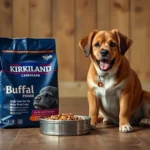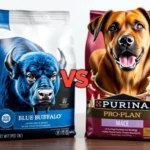
Introduction
Proper dog nutrition is crucial for maintaining your furry friend’s health and wellbeing. A balanced diet ensures that dogs receive the essential nutrients they need to thrive, which can significantly impact their longevity and quality of life. However, as pet owners, we sometimes find ourselves in situations where we need to reconsider the dog food we purchased. This leads us to an important question: can you return dog food to Walmart? In this article, we will explore both the essentials of dog nutrition and the specifics of Walmart’s return policies concerning dog food.
Understanding Dog Nutrition
Importance of Proper Dog Nutrition
Just like humans, dogs require a balanced diet to support their bodily functions. Poor nutrition can lead to various health issues, including obesity, diabetes, heart disease, and digestive problems. A well-nourished dog is more likely to have a shiny coat, healthy skin, and a robust immune system.
Key Nutrients for Dogs
To ensure your dog receives optimal nutrition, it’s essential to understand the key nutrients that should be included in their diet:
- Proteins: Essential for growth, maintenance, and repair of body tissues. High-quality protein sources include meat, fish, and eggs.
- Carbohydrates: Serve as a primary energy source and aid in digestion. Whole grains, vegetables, and fruits are excellent carbohydrate sources for dogs.
- Fats: Provide essential fatty acids that support skin health, coat condition, and energy levels. Look for fats such as fish oil and flaxseed oil.
- Vitamins and Minerals: Each dog has specific nutritional needs based on their breed, age, and health conditions. Essential vitamins and minerals help support various bodily functions, including bone health and immune function.
Understanding Dog Food Labels
Reading dog food labels is a vital skill for any pet owner. Here are some tips for interpreting these labels:
- Ingredients to Look For: High-quality protein sources should be listed as the first ingredient. Look for whole foods and avoid fillers like corn or soy.
- Ingredients to Avoid: Beware of artificial preservatives, colors, and flavors. Also, avoid foods with vague terms like “meat by-products.”
- Importance of AAFCO Standards: The Association of American Feed Control Officials (AAFCO) sets nutritional standards for pet foods. Look for the AAFCO statement on the packaging to ensure the food meets these guidelines.
Dog Food Types
Dry Dog Food (Kibble)
Kibble is one of the most common types of dog food.
- Benefits: It’s convenient, has a long shelf life, and can help maintain dental health due to its texture.
- Drawbacks: Some kibble can be low in moisture, which may not be suitable for all dogs, especially those that need more hydration.
Recommended brands often include Orijen, Wellness, and Blue Buffalo.
Wet Dog Food
Wet dog food provides a different texture and moisture content.
- Advantages: It’s usually more palatable for picky eaters and provides additional hydration.
- Disadvantages: It can be more expensive and may have a shorter shelf life once opened.
Popular options include Hill’s Science Diet and Royal Canin.
Raw Diet
A raw feeding approach is gaining popularity among dog owners.
- Overview: This diet consists of raw meat, bones, fruits, and vegetables.
- Benefits: Proponents claim it leads to healthier skin, shinier coats, and improved digestion.
- Potential Risks: Raw diets can pose risks of bacterial contamination and require careful preparation to ensure nutritional balance.
Homemade Dog Food
Preparing homemade dog food can be a rewarding option.
- Guidelines for Preparing Balanced Meals: Ensure that meals are balanced, including proteins, carbohydrates, and essential nutrients.
- Common Mistakes to Avoid: Failing to include all necessary nutrients or using toxic ingredients like onions or chocolate can be harmful to your dog.
Walmart’s Dog Food Return Policy
Overview of Walmart’s Return Policy
Walmart has a comprehensive return policy for pet food, which generally allows for returns of unopened dog food within a specific timeframe.
- General Return Policy: Most items can be returned within 90 days, but perishables and specific items may have different rules.
- Timeframe for Returns: Customers should check their receipts for specific return periods.
Special Considerations for Dog Food Returns
Health and safety regulations play a significant role in dog food returns.
- Opened vs. Unopened: Typically, unopened dog food can be returned more easily than opened products.
- Specific Brands or Types: Some premium brands may have unique policies due to their ingredients or formulations.
Step-by-Step Guide to Returning Dog Food to Walmart
If you need to return dog food to Walmart, follow this guide:
- Preparing for the Return: Check your receipt and the condition of the product.
- What to Bring: Bring the unopened dog food and the original receipt.
- How to Process the Return: You can return the item in-store or online. In-store returns typically involve visiting the customer service desk, while online returns can be processed through the Walmart website.
Alternatives to Returning Dog Food
Donating Unopened Food
If returning dog food isn’t an option, consider donating it.
- Suggested Organizations and Shelters: Local animal shelters, rescue groups, and food banks often accept pet food donations.
- Benefits of Donating: This not only helps those in need but also supports local animal welfare initiatives.
Selling or Giving Away
If you have dog food that you cannot use, selling or giving it away is another option.
- Platforms to Use: Websites like Facebook Marketplace, Craigslist, and local community groups can help you find a new home for the food.
- Community Groups and Social Media Options: Many local community groups are eager to help find good homes for pet supplies.
Storing Leftover Dog Food
If you have leftover dog food, proper storage is essential.
- Tips for Proper Storage: Keep dog food in a cool, dry place, and use airtight containers to maintain freshness.
- Shelf Life of Different Types: Kibble typically lasts longer than wet food, while homemade or raw diets have significantly shorter shelf lives.
Common Questions About Dog Nutrition and Returns
Can You Return Opened Dog Food to Walmart?
Generally, returning opened dog food to Walmart is not permitted due to health regulations. Some exceptions may apply, but these are rare and typically require a manager’s approval.
What to Do If Your Dog Has Food Allergies?
Transitioning to a new dog food can be a challenge.
- Tips on Transitioning: Gradually introduce the new food over 7-10 days to avoid digestive upset.
- Importance of Consulting a Vet: If your dog has specific allergies, it’s crucial to consult your veterinarian or a pet nutritionist for tailored advice.
How to Choose the Right Dog Food?
Selecting the right dog food involves several factors.
- Factors to Consider: Age, breed, activity level, and any specific health issues should guide your selection.
- Importance of Consulting a Vet: A veterinary professional can provide personalized recommendations based on your dog’s unique needs.
Conclusion
Understanding dog nutrition is vital for the health and happiness of your canine companion. With the right diet, you can help prevent many health issues and ensure a long, fulfilling life for your pet. Alongside this, knowing can you return dog food to Walmart can ease concerns when a product doesn’t meet your expectations. Always make informed choices about dog food to support your pet’s wellbeing and happiness.









